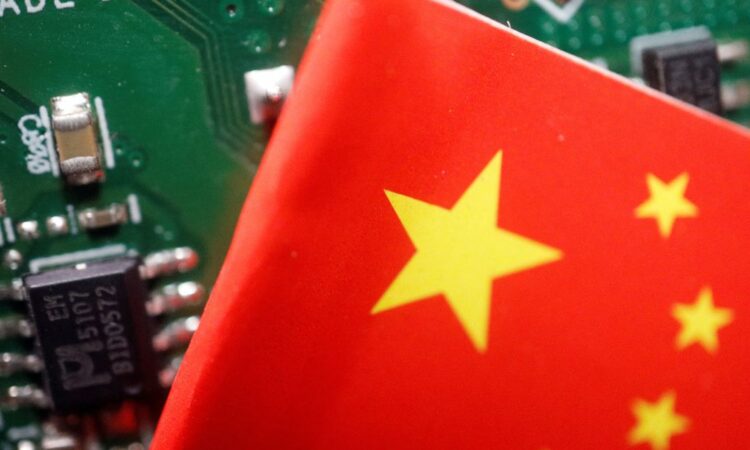Factbox: Chinese chipmaking equipment manufacturers filling void left by U.S. export restrictions

SHANGHAI, March 6 (Reuters) – The United States is working to expand its restrictions on the export of chipmaking equipment to China by securing cooperation with the Netherlands and Japan, forcing Chinese chipmakers to turn to domestic suppliers such as those listed below.
SHANGHAI MICRO ELECTRONICS EQUIPMENT (SMEE)
SMEE is China’s only producer of lithography machines used in semiconductor manufacturing, making it the country’s only potential competitor to the Netherlands’ world-leading lithography machine maker ASML Holding NV (ASML.AS). However, it remains well behind ASML and Japanese peers.
It has developed machines capable of producing chips at the 90 nanometre node standard, its website showed. That technology was perfected roughly 20 years ago and is sufficient for low-end chips useful for some power-management purposes.
The firm sells the majority of its lithography machines to chip packaging plants who use them for the much simpler task of wiring chips into final products, industry sources said.
Latest Updates
View 2 more stories
SMEE did not respond to a request for comment.
SMEE was established in 2002 by He Rongming, a former vice president at Shanghai Electric Group Co Ltd (601727.SS). Its largest shareholder, owning 32%, is the Assets Supervision and Administration Commission of the State Council (SASAC), which oversees state-owned enterprises.
NAURA TECHNOLOGY GROUP CO LTD (002731.SZ)
Founded in 2001 and listed in 2010, Naura primarily makes etching equipment in competition with the United States’ Applied Materials Inc (AMAT.O) and Lam Research Corp (LRCX.O) as well as Japan’s Tokyo Electron Ltd (8035.T).
Naura’s most advanced etching machine supports 55 nm and 28 nm chipmaking technology, well behind the leading edge of chip manufacturing.
The firm also makes deposition machines, which apply chemicals and gases to silicon wafers throughout the chipmaking process. It produces machines that can service the 14 nm to 28 nm process nodes of its deposition machines.
Beijing Sevenstar Electronics is its biggest shareholder, followed by a state-led fund that invests in the chip industry.
ADVANCED MICRO-FABRICATION EQUIPMENT INC CHINA (AMEC) (688012.SS)
AMEC makes etching equipment used to remove excess material from the surface of silicon wafers.
Some of its machines have entered production lines for chips as advanced as those using 5 nm technology, its January-June 2022 earnings report showed, making it technologically closer than Chinese peers to competing with Lam Research and Applied Materials.
However, AMEC’s market share is dwarfed by overseas rivals. In 2021, it generated 3.1 billion yuan ($444.9 million) in revenue, roughly 2.5% that of Applied Materials.
AMEC was founded in 2003 by Gerald Yin, a naturalised U.S. citizen. It is roughly 15% owned by China’s “Big Fund” for chips and 15% owned by a technology venture capital firm affiliated with the Shanghai government.
BEIJING E-TOWN SEMICONDUCTOR TECHNOLOGY CO LTD (BEST)
BEST produces degumming equipment used to remove photoresist chemicals during the lithography process. This segment accounted for over 47% of its 2020 revenue, an investment prospectus showed.
The firm also produces etching machines, though they account for only a single-digit percentage of revenue.
BEST was founded in 2015. Its largest shareholder is Beijing E-Town Capital, a venture capital fund under the Beijing municipal government that has invested in a number of chip firms.
ACM RESEARCH INC (ACMR.O)
ACM designs equipment to clean wafers in competition with Lam Research, Tokyo Electron, Japan’s Screen Holdings Co Ltd (7735.T) and South Korea’s Mujin Electronics Co Ltd (MUJIN.UL).
Most of its revenue comes from a small number of customers in mainland China, namely Huahong, SMIC and YMTC, a stock exchange filing showed. It has also sold equipment to South Korea’s SK Hynix Inc (000660.KS).
ACM was founded in 1998 in California by U.S. citizen David Wang and went public on the NASDAQ in 2017. Its Shanghai-based subsidiary (688082.SS) went public on the STAR market in 2021.
ACM Research owns 80% of the Shanghai subsidiary, while China’s Big Fund and a number of other government-related funds hold single-digit shares the Chinese entity. The two companies have different boards of directors.
While ACM’s headquarters are the United States, almost 90% of its staff are based in mainland China and Taiwan, and most of its research and development and sales take place in those locations, the company said in its 2021 annual report.
($1 = 6.9684 Chinese yuan renminbi)
Reporting by Josh Horwitz; Editing by Christopher Cushing
Our Standards: The Thomson Reuters Trust Principles.






